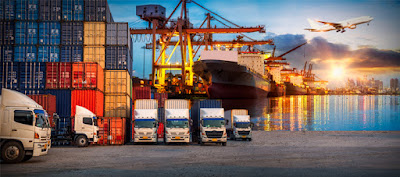Top 5 Logistics Interview Questions & Answers
"Amateurs talk about strategy. Professionals discuss logistics."
Every company uses logistics even though full-time logistics managers may not be employed. The work of a logistician begins with bringing in the supplies and raw materials necessary for a business or organization to operate. Inbound logistics are then used in conjunction with outbound logistics to distribute products or services where they are in demand.
If you are thinking about a career change, the field of logistics has much to offer.
1. What are the activities performed at the operational level in logistics?
Various activities at the operational level including
• Goods receipt and checking
• Bulk storage
• Order picking
• Stock replenishment
• Order marshaling
• Load Scheduling
• Returns
• Availability of Personnel
• Update of stock
• Completion of documentation
• Goods receipt and checking
• Bulk storage
• Order picking
• Stock replenishment
• Order marshaling
• Load Scheduling
• Returns
• Availability of Personnel
• Update of stock
• Completion of documentation
2. What does a bill of lading include?
A bill of lading includes the following details• Name and complete address of shippers and receivers
• Special account numbers or PO used between business for order tracking
• Instruction for the carrier for secure delivery
• Date of the shipment
• Number of shipping units
• Types of packaging that includes cartons, pallets, skids, and drums
• Description about the shipped items (common name & material of manufacture)
• Declared value of the goods being shipped
• Note included if there is any hazardous substance in it
• Exact weight of the shipments – for multiple commodities, weight for each commodity is mentioned separately
• Freight classification of the items shipped, according to NMFC (National Motor freight classification)
3. Mention what is freight class based on?
Freight class is based on four factors
• Density: Weight per cubic foot
• Freight Stowability: width and length based on carrier mode rules
• Ease of handling: Evaluation of the effort required in transporting
• Liability: It includes liability to damage, breathability, and perishability, freight price per pound, and susceptibility of theft.
4. What are the main supply chain challenges companies face today?
The five big challenges that companies face today is- Ignoring the continued growth of e-commerce as a channel in the industrial sector
- No attention to the potential risk like volatile transportation costs
- Over expectation that supply chain management technologies will fix everything
- Over-reliance on past performance to predict future sales
- Increase complexity added to supply chain operations with the implementation of unnecessary technologies
- Lack of understanding of the full capacities of suppliers and service
5. What are the important aspects of transportation and fleet management?
The important aspects of transportation and fleet management- Transport Acquisition
- Transport Planning
- Routing maintenance planning
- Fleet Maintenance and Scheduling
- Risk management
- Human resource management
“You will not find it difficult to prove that battles, campaigns, and even wars have been won or lost primarily because of logistics.”
-Gazi Sanaul Hasan


Comments
Post a Comment